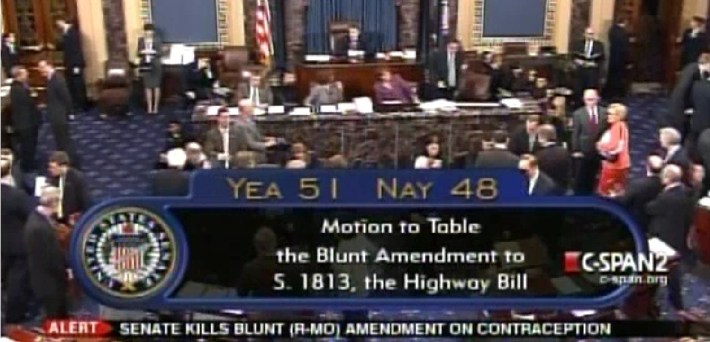The U.S. Senate voted 51-48 today to reject an amendment to their transportation bill that would overturn measures in President Obama's signature health care law dealing with contraception coverage. The vote clears the way for the Senate to finally begin considering actual transportation issues rather than dealing with delay tactics.
The so-called "conscience" amendment, proposed by Missouri Senator Roy Blunt, was one of two that recently drew the ire of Democrats Barbara Boxer and Harry Reid for delaying the approval of the underlying bill.
The other amendment, proposed by Rand Paul of Kentucky, would withhold aid to Egypt until the American NGO employees there were allowed to leave the country -- and today, they were.
Attention can now turn to the meat of the Senate's transportation proposal. Without missing a beat, 17 environmental organizations, including the Sierra Club and Republicans for Environmental Protection, have just sent a letter to the Senate outlining the best -- and worst -- of the remaining amendments:
Facing the expiration of the current transportation authorization on March 31, some have tried to attach unrelated, environmentally damaging provisions, such as permitting the dirty and dangerous Keystone XL pipeline (Hoeven SA 1537) and rolling back existing clean air standards to reduce toxic pollution from industrial boilers and cement plants (Collins SA 1660, Barrasso SA 1618)...
As this legislation moves forward, we encourage you to support amendments that will further reduce oil consumption in the transportation sector and provide Americans with access to clean, affordable transportation choices such as transit, biking and walking.
The letter contained an outright endorsement of several amendments, including the Cardin-Cochran proposal to give metro areas greater control over bike-ped funding.
Other supported amendments include making congestion mitigation and air quality improvement (CMAQ) a required part of state transportation planning, and offering financing for local governments to build public infrastructure around transit nodes.
The letter also called out two amendments, both proposed by Utah Republican Orrin Hatch, for being particularly damaging. "These amendments would deepen our addiction to oil by linking infrastructure funding to increased oil drilling in our nation’s wildest places, such as the Arctic National Wildlife Refuge, and rescinding funds from the Advanced Technology Vehicle Manufacturing loan program, which helps automakers retool to manufacture cleaner, more efficient vehicles," the letter reads.
T4America is also maintaining its amendment tracker page, which after today's action will finally have changes to track.
Read the full text of the environmental groups' letter after the jump.






